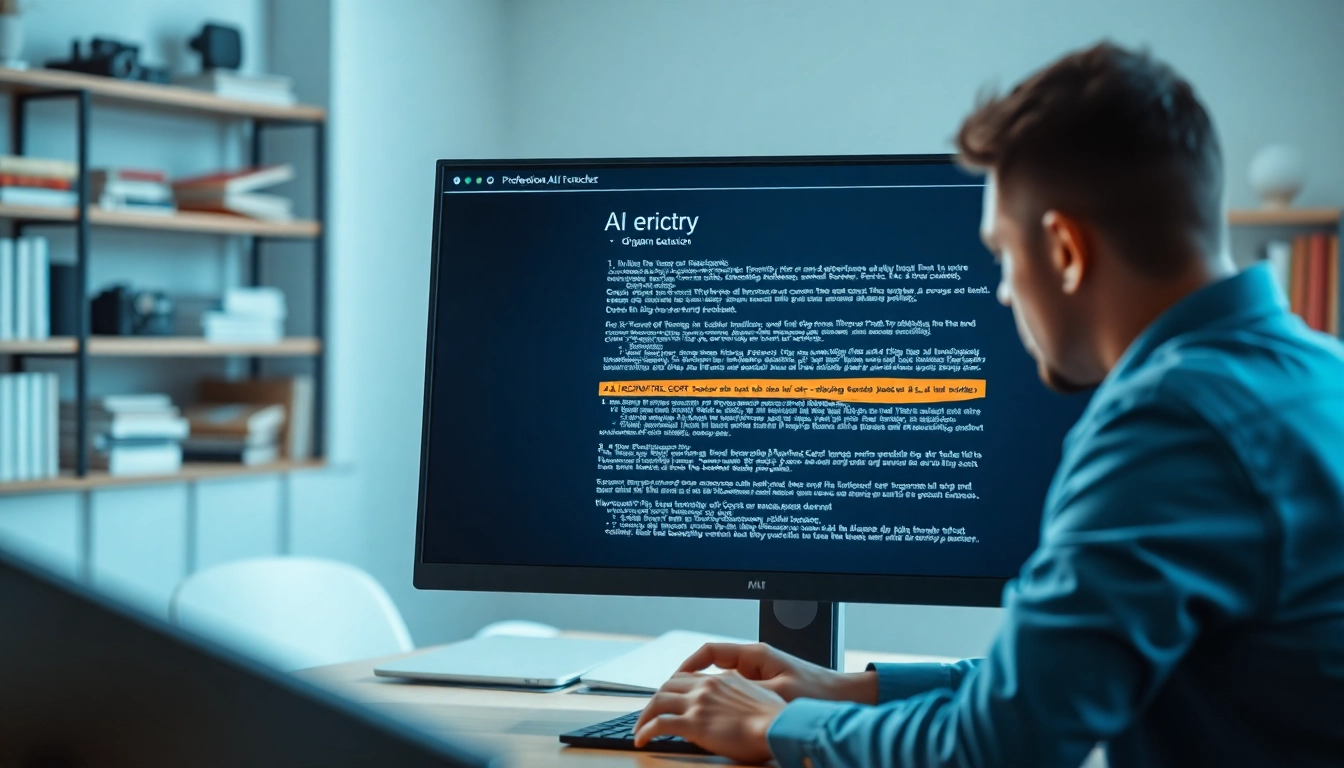
Understanding AI Checker Technology
What is an AI Checker?
An AI checker is a sophisticated tool designed to analyze text and determine whether it has been generated by artificial intelligence or by a human. This technology has gained prominence as AI-generated content becomes increasingly prevalent in various domains, from academic writing to digital marketing. AI checkers utilize natural language processing (NLP) algorithms and machine learning techniques to evaluate the structure, style, and substance of the text, comparing it against known characteristics of AI-generated writings.
How AI Checkers Work
AI checkers operate through a multi-stage methodology that typically includes:
- Text Analysis: The checker breaks down the submitted text into its fundamental elements, analyzing syntax, vocabulary, and stylistic choices.
- Pattern Recognition: By employing machine learning models, the AI checker compares the analyzed text against vast datasets of both AI-generated and human-generated content to identify distinctive patterns.
- Scoring System: The results are usually presented as a score or percentage, indicating the likelihood that the text was AI-generated.
This complex process allows users to receive feedback on the authenticity of their content, identifying potential issues before publication.
The Importance of AI Detection
The necessity for robust AI detection mechanisms has never been greater. As AI writing tools become more sophisticated, distinguishing between human and machine-generated content is crucial for maintaining integrity in various sectors. The implications of AI detection span across education, journalism, and creative industries, where the authenticity of content must be preserved to ensure trustworthiness and credibility.
Benefits of Using an AI Checker
Ensuring Content Authenticity
One of the primary benefits of using an AI checker is the assurance of content authenticity. In contexts such as academic writing, original research, and creative expression, verifying that the content is not derived from AI generators helps uphold standards of integrity. Without such verification, organizations and individuals risk compromising their reputations and credibility.
Enhancing Academic Integrity
For educational institutions, AI checkers play a vital role in preserving academic integrity. By ensuring that students submit original work, these tools mitigate instances of plagiarism and misrepresentation. Furthermore, they empower educational institutions to foster a culture of honesty and accountability, ultimately benefiting students in their learning journeys.
Protecting Creativity and Intellectual Property
Creativity should be protected, and AI checkers serve as a safeguard for intellectual property. For authors, artists, and content creators, the risk of having their work misappropriated or falsely represented as AI-generated is significant. Utilizing an AI checker can help detect and address misuse, allowing creators to maintain control over their intellectual pursuits.
Choosing the Right AI Checker
Key Features to Look For
Selecting the appropriate AI checker requires considering several key features:
- Accuracy: The primary attribute of an effective AI checker is its ability to accurately differentiate between human and AI-generated content.
- User-Friendliness: A straightforward interface that simplifies the process for users can significantly enhance the experience.
- Reports and Insights: An ideal AI checker will provide thorough reports that outline the reasoning behind its assessments, aiding users in understanding potential areas for improvement.
- Multilingual Support: For global applications, the ability to analyze text in multiple languages can be an indispensable feature.
Comparing Different AI Checkers
When choosing the right AI checker, it is vital to compare various options based on the aforementioned features. Reviews and user experiences often provide insight into the effectiveness and reliability of each tool. Additionally, examining pricing models, accessibility, and customer support can guide you towards a solution that fits both your needs and budget.
User Reviews and Recommendations
User reviews can provide valuable feedback on the performance of AI checkers. Look for platforms where users share their experiences and offer recommendations. This feedback can assist in making an informed decision, ensuring you select a tool that meets your requirements effectively.
Implementing AI Checker in Your Workflow
Step-by-Step Guide to Using an AI Checker
Integrating an AI checker into your content creation workflow involves a few straightforward steps:
- Select an AI Checker: Based on the features discussed, choose an AI checker that fits your needs.
- Prepare Your Text: Ensure the text is formatted correctly and free of any extraneous elements that might confuse the checker.
- Analyze Your Content: Use the AI checker to submit your text and receive immediate feedback.
- Review Results: Examine the analysis, noting areas that may need revision or improvement.
- Revise and Resubmit: Make the necessary adjustments to ensure the authenticity of your content.
Integrating AI Checkers into Academic Systems
For academic institutions, integrating AI checkers requires a collaborative approach involving stakeholders across departments. Setting up a central system where students can access AI checkers will facilitate the detection of AI-generated content. Training sessions can help both faculty and students understand how to use these tools effectively, enhancing their commitment to academic integrity.
Tips for Maximizing Detection Accuracy
To ensure you get the most accurate results from an AI checker, consider the following tips:
- Use Quality Input: Ensure the text you are checking is high quality and representative of the content you typically produce.
- Understand the Limitations: Familiarize yourself with the limitations of your chosen AI checker. Not all checkers are created equal; therefore, knowing their strengths and weaknesses can lead to better utilization.
- Run Multiple Checks: If possible, use different AI checkers to cross-validate results, as each tool may have unique algorithms.
Future of AI Checkers in Content Creation
Emerging Trends in AI Detection
The future of AI checkers is poised for exciting developments. Advances in machine learning and NLP are likely to enhance the accuracy and functionality of these tools. Trends indicate a shift towards more intuitive user interfaces and the integration of AI checkers with content management systems, enabling seamless workflows in content creation and collaboration.
Challenges and Limitations
Despite their growing importance, AI checkers are not without challenges. One major limitation is the evolving nature of AI-generated content itself. As AI models improve, they may produce text that is increasingly indistinguishable from human writing, making detection more complex. Additionally, the reliance on technological solutions must be balanced with the ethical considerations surrounding privacy and data usage.
Conclusion: The Role of AI Checkers in Modern Writing
As content creation continues to evolve in the digital landscape, AI checkers will play a crucial role in maintaining authenticity, integrity, and creativity. With a commitment to understanding and implementing these tools in our workflows, we can harness the power of AI while ensuring that human creativity remains at the forefront of writing. As such, integrating an ai checker into our processes not only preserves the quality of our content but also safeguards the trust of our audiences.






